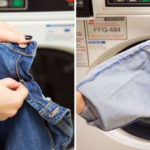How long does a washing machine last?
Washing machines usually have a lifespan of 5 to 15 years. According to experts, it all depends on how often you use it, what you put in it, and how you maintain it.
Jason Carter, a home appliance technician and owner of SimplySwider.com, said, “In the past, washing machines were built to last a long time, often reaching the 20-year mark. But factors such as cost-cutting measures and changes in manufacturing materials have been causing things to change.”
If your washing machine has been in use for 10 years and still works well, then you should maintain it and continue using it. Just pay attention to how it operates.
 How should you maintain a washing machine?
How should you maintain a washing machine?
First, don’t overload the washing machine with too many clothes; it will make the machine work harder than necessary and shorten its lifespan.
Haven Polich, the product manager at ASKO Appliances, said, “When starting a laundry cycle, don’t fill the drum to the brim and make sure to select the appropriate program for each wash cycle. This program will automatically adjust to clean everything from delicate fabrics to heavy-duty items with maximum efficiency.”
“Your clothes will last longer, and so will your machine!” Haven Polich added.
You’ll also want to regularly clean the washing machine, including running cycles to clean the interior, scrubbing surfaces to remove any detergent residue, as well as cleaning the knobs and buttons.
When should you replace your washing machine?
Luckily, washing machines will give you signs that they need replacing. Here’s what to look for:
1. Leakage issues
If there’s water leaking out, that’s a problem.
Nick Valentino, Market Executive Director at Bellhop, said, “Especially if the leakage doesn’t seem to be coming from the drain area, that’s a sign that your washing machine has structural issues. Even if the leakage isn’t a problem that makes you feel the need to immediately replace a washing machine, it will still lead to rusting and potentially damage the electronics.”
2. Decreasing performance
If your laundry is no longer as clean as before or has the potential to damage clothing, it’s probably time to replace the machine.
Keith Sant, founder and CEO of Sell My House Company, said, “This is especially true if you find yourself having to adjust settings to get your clothes cleaner or having to run multiple cycles to get them clean.”
3. Noise or vibration
Sazi Bugay, Product Management Deputy Director at Beko Appliances, said, “If you hear strange noises or feel excessive shaking from your washing machine, that’s a sign that something is about to break or has already broken. That’s something to investigate right when the problem occurs. If caught early on, you can repair the appliance and make it last longer.”
4. Issues with machine’s feet pads
Bugay also mentioned paying attention to the feet pads. If they start coming off the shell or develop excessive moisture and mold on them, it’s time to buy a new unit.
5. More frequent repairs
Just like a car, at some point, you’ll feel that it’s time to stop repairing and buy a new one. Carter said, “If you find yourself constantly scheduling repairs and spending more on repairs than the value of the machine, then that might be a sign to start considering purchasing a new appliance.”
6. Electrical issues
Water and electricity are two things that don’t go well together.
Sant said, “If you start experiencing electrical issues, such as water not filling or the washing machine not running as it should, that can be due to a problem with the motor or the internal electrical system. It’s both a hazardous issue and a major repair to consider. You should consider replacing the entire unit.”
According to PNVN





































